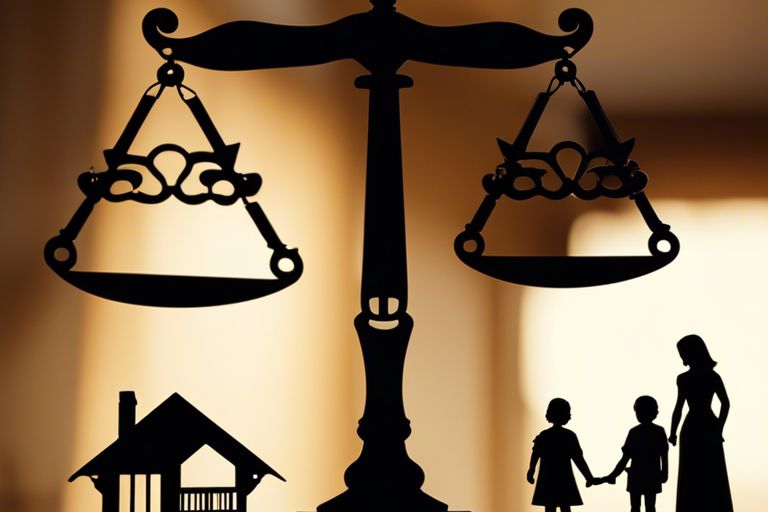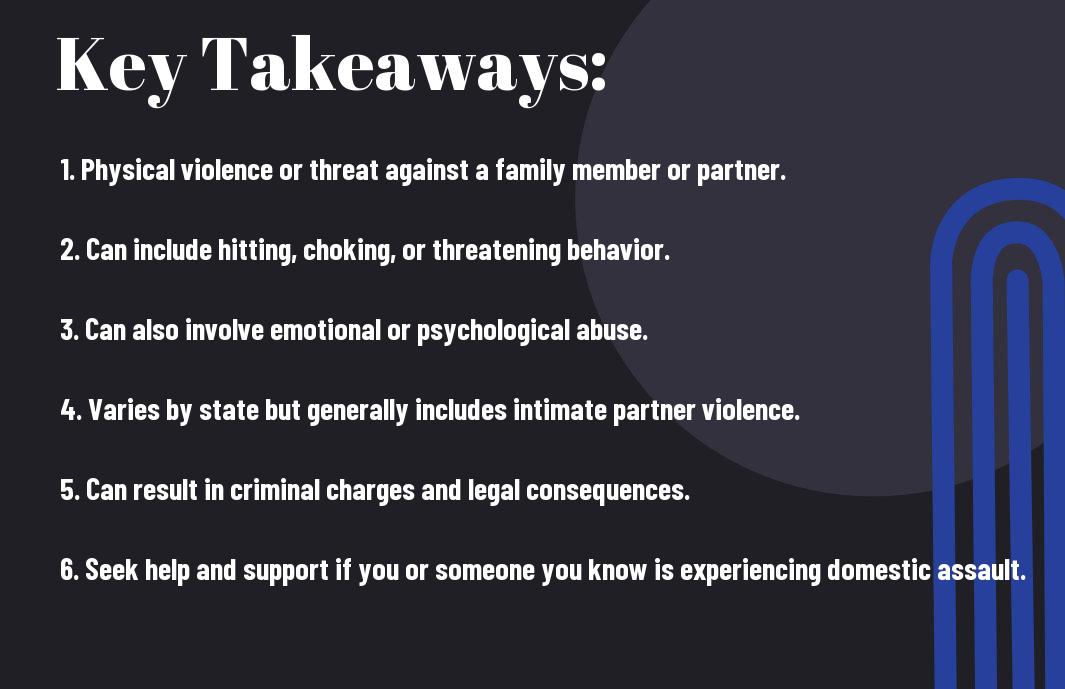Defining domestic assault is crucial in recognizing and addressing this pervasive issue. Domestic assault is a serious crime that occurs between people in a domestic relationship, such as spouses, partners, or family members. It can involve physical violence, threats, intimidation, and emotional abuse, and the legal definition varies depending on the jurisdiction. Understanding the legal framework is essential in protecting yourself or your loved ones from potential harm and seeking justice for any offenses committed. In this blog post, I will outline the definition of domestic assault and provide insights into how it is defined legally.
Key Takeaways:
- Definition: Domestic assault is defined as the act of knowingly or recklessly causing bodily injury to a family or household member, or placing them in fear of imminent bodily injury.
- Family or Household Member: This can include current or former spouses, individuals who share a child, or people who currently or previously resided together.
- Legal Consequences: Depending on the severity and circumstances of the assault, the legal consequences can range from fines and probation to imprisonment.
- Protective Orders: Victims of domestic assault can seek protective orders to keep the assailant away from them and their residence, as well as other forms of legal protection.
- Importance of Seeking Help: It is crucial for victims of domestic assault to seek help from law enforcement, legal resources, and support services to ensure their safety and well-being.
Understanding Domestic Assault
Before delving into the legal definition of domestic assault, let’s first understand what it entails. Domestic assault, also referred to as domestic violence, occurs when one person in a close relationship causes physical or psychological harm to the other. This type of violence can take many forms, including physical abuse, emotional abuse, sexual abuse, economic abuse, and psychological abuse.
Definition and Legal Framework
Domestic assault is defined legally as any act of violence committed by one member of a household or family against another. This includes spouses, former spouses, dating partners, family members, or cohabitants. The legal framework for addressing domestic assault varies by jurisdiction, but it generally involves criminal charges and protective orders to ensure the safety of the victim. For more information on the legal aspects of domestic violence, you can visit Domestic Violence – Criminal Charges.
Types of Domestic Assault
Domestic assault can manifest in various forms, each with its own set of damaging consequences. The most common types of domestic assault include physical abuse, emotional abuse, sexual abuse, economic abuse, and psychological abuse. Perceiving the signs of abuse is crucial to addressing the issue and seeking help for the victim. Below is a breakdown of the types of domestic assault:
| Physical Abuse | Inflicts physical harm such as hitting, kicking, or choking. |
| Emotional Abuse | Causes emotional pain, anguish, or distress through manipulation or intimidation. |
| Sexual Abuse | Forces unwanted sexual contact or coercion within an intimate relationship. |
| Economic Abuse | Controls finances, limits access to resources, or obstructs employment opportunities. |
| Psychological Abuse | Inflicts mental or emotional harm, including verbal threats or belittling. |

Some signs of domestic assault may not be immediately obvious, but knowing what to look for can help you or someone you know get the help needed. Domestic assault can take many forms, including physical, emotional, and psychological abuse. By recognizing the signs of abuse, you can take steps to protect yourself and others from harm.
Physical and Emotional Indicators
Physical indicators of domestic assault may include unexplained injuries such as bruises, cuts, or broken bones. Victims may also make frequent visits to the emergency room or doctor’s office. Emotional indicators of domestic assault can include low self-esteem, anxiety, depression, and withdrawal from social activities. If you notice these signs in yourself or someone you know, it’s important to reach out for help and support.
Impact on Victims and Families
Domestic assault has a significant impact on victims and their families. Victims may experience feelings of fear, shame, and helplessness. They may also struggle with trust and intimacy in their relationships. Children who witness domestic assault may suffer from emotional and behavioral problems, affecting their long-term well-being. It’s crucial to recognize the impact of domestic assault so that victims and their families can access the support and resources they need to heal and recover.
Legal Consequences and Support Options
Your actions have legal consequences, and it’s important to understand the potential outcomes of a domestic assault charge. If you are found guilty of domestic assault, you could face criminal penalties including jail time, fines, and probation. Additionally, the court may issue a protective order against you, restricting contact with the victim and potentially requiring you to attend counseling or anger management classes.
Criminal Penalties and Protective Orders
If convicted of domestic assault, you may face jail time, especially if the assault resulted in serious bodily harm or involved the use of a weapon. In addition to imprisonment, you may also be required to pay fines and comply with a protective order. This order can include provisions that prohibit any contact with the victim, as well as requiring you to stay a certain distance away from them and their residence. Violating a protective order can result in further legal consequences, so it’s important to take it seriously and comply with all provisions.
Resources for Victims and Perpetrators
As both a victim and a perpetrator of domestic assault, there are resources available to assist you. As a victim, you can seek support from domestic violence hotlines, shelters, and counseling services. These resources can provide you with guidance, safety planning, and emotional support. Perpetrators can also seek help through intervention programs and counseling to address the root causes of their behavior and learn healthier ways of managing conflict. It’s important to recognize that help is available, and reaching out for support is a positive step toward healing and change.

How Is a Domestic Assault Defined Legally?
Hence, in conclusion, it is important to understand the legal definition of domestic assault in your state in order to know your rights and potential consequences. By familiarizing yourself with the specific elements of domestic assault in your jurisdiction, you can better understand the charges you may be facing and the potential legal defenses available to you. For more information on how domestic assault is defined under Minnesota state law, you can visit our website.
FAQ
Q: What is domestic assault?
A: Domestic assault, also known as domestic violence, refers to any act of violence or abuse committed by one family or household member against another. This can include physical, emotional, sexual, or psychological abuse.
Q: How is domestic assault defined legally?
A: The legal definition of domestic assault varies by jurisdiction, but generally it includes any intentional physical harm, threat of harm, or reckless behavior that causes bodily injury to a family or household member. It can also encompass behavior that puts the victim in fear of imminent harm.
Q: Who can be a victim of domestic assault?
A: Anyone can be a victim of domestic assault, regardless of gender, age, race, or sexual orientation. Family or household members, including spouses, former spouses, parents, children, and individuals in dating or cohabitating relationships, can be victims of domestic assault.
Q: What are the legal consequences of domestic assault?
A: Legal consequences of domestic assault can include criminal charges, protective orders, mandatory counseling or treatment programs, and in some cases, incarceration. The severity of the consequences depends on the nature of the assault and the laws of the jurisdiction in which it occurred.
Q: How can someone get help if they are a victim of domestic assault?
A: Victims of domestic assault should seek help from law enforcement, domestic violence hotlines, shelters, or legal aid organizations. It is important for victims to create a safety plan, seek medical attention if needed, and obtain legal protection through restraining orders or protective orders.









Leave a comment